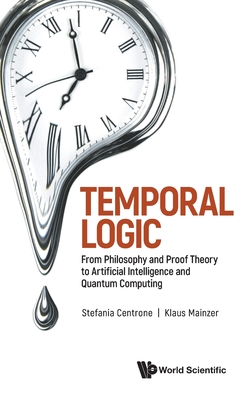Temporal Logic: From Philosophy and Proof Theory to Artificial Intelligence and Quantum Computing

Temporal Logic: From Philosophy and Proof Theory to Artificial Intelligence and Quantum Computing
Computationally, temporal operators can be introduced in different formalisms with increasing complexity such as Basic Modal Logic (BML), Linear-Time Temporal Logic (LTL), Computation Tree Logic (CTL), and Full Computation Tree Logic (CTL*). Proof-theoretically, these formalisms of temporal logic can be interpreted by the sequent calculus of Gentzen, the tableau-based calculus, automata-based calculus, game-based calculus, and dialogue-based calculus with different advantages for different purposes, especially in computer science.
The book culminates in an outlook on trendsetting applications of temporal logics in future technologies such as artificial intelligence and quantum technology. However, it will not be sufficient, as in traditional temporal logic, to start from the everyday understanding of time. Since the 20th century, physics has fundamentally changed the modern understanding of time, which now also determines technology. In temporal logic, we are only just beginning to grasp these differences in proof theory which needs interdisciplinary cooperation of proof theory, computer science, physics, technology, and philosophy.
Calculi of temporal logic are widely used in modern computer science. The temporal organization of information flows in the different architectures of laptops, the Internet, or supercomputers would not be possible without appropriate temporal calculi. In the age of digitalization and High-Tech applications, people are often not aware that temporal logic is deeply rooted in the philosophy of modalities. A deep understanding of these roots opens avenues to the modern calculi of temporal logic which have emerged by extension of modal logic with temporal operators. Computationally, temporal operators can be introduced in different formalisms with increasing complexity such as Basic Modal Logic (BML), Linear-Time Temporal Logic (LTL), Computation Tree Logic (CTL)
PRP: 725.40 Lei
Acesta este Pretul Recomandat de Producator. Pretul de vanzare al produsului este afisat mai jos.
652.86Lei
652.86Lei
725.40 LeiIndisponibil
Descrierea produsului
Computationally, temporal operators can be introduced in different formalisms with increasing complexity such as Basic Modal Logic (BML), Linear-Time Temporal Logic (LTL), Computation Tree Logic (CTL), and Full Computation Tree Logic (CTL*). Proof-theoretically, these formalisms of temporal logic can be interpreted by the sequent calculus of Gentzen, the tableau-based calculus, automata-based calculus, game-based calculus, and dialogue-based calculus with different advantages for different purposes, especially in computer science.
The book culminates in an outlook on trendsetting applications of temporal logics in future technologies such as artificial intelligence and quantum technology. However, it will not be sufficient, as in traditional temporal logic, to start from the everyday understanding of time. Since the 20th century, physics has fundamentally changed the modern understanding of time, which now also determines technology. In temporal logic, we are only just beginning to grasp these differences in proof theory which needs interdisciplinary cooperation of proof theory, computer science, physics, technology, and philosophy.
Calculi of temporal logic are widely used in modern computer science. The temporal organization of information flows in the different architectures of laptops, the Internet, or supercomputers would not be possible without appropriate temporal calculi. In the age of digitalization and High-Tech applications, people are often not aware that temporal logic is deeply rooted in the philosophy of modalities. A deep understanding of these roots opens avenues to the modern calculi of temporal logic which have emerged by extension of modal logic with temporal operators. Computationally, temporal operators can be introduced in different formalisms with increasing complexity such as Basic Modal Logic (BML), Linear-Time Temporal Logic (LTL), Computation Tree Logic (CTL)
Detaliile produsului








